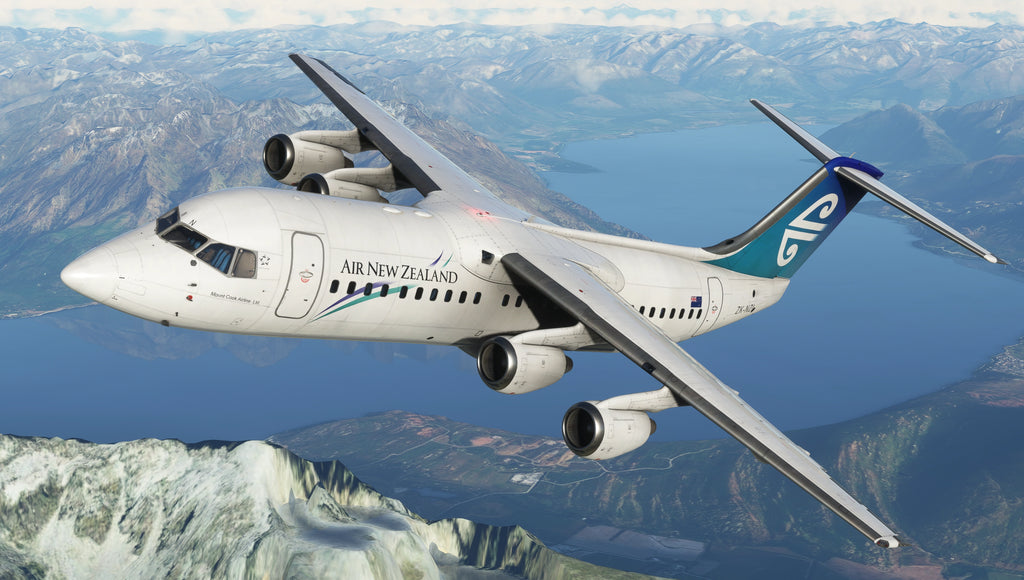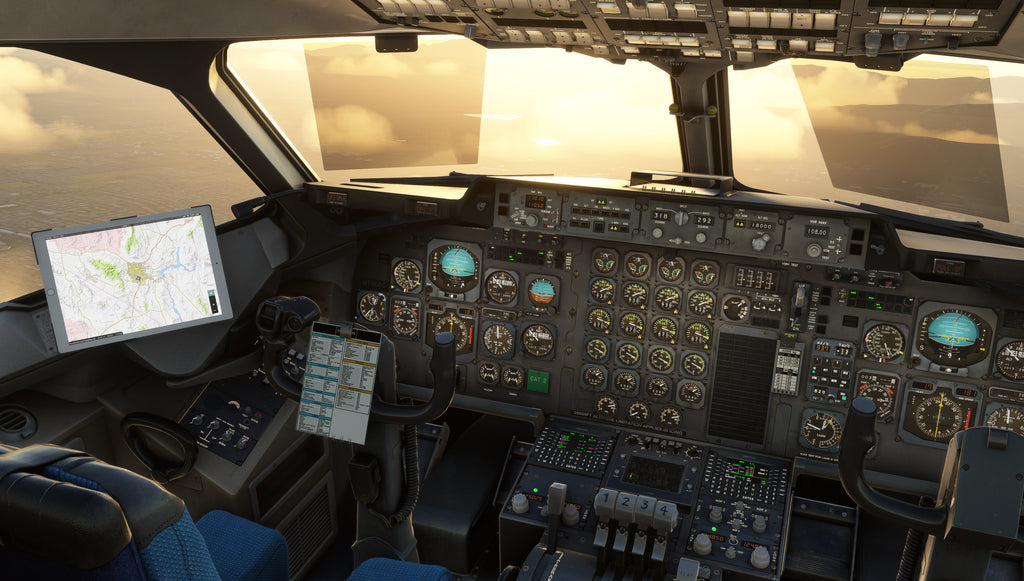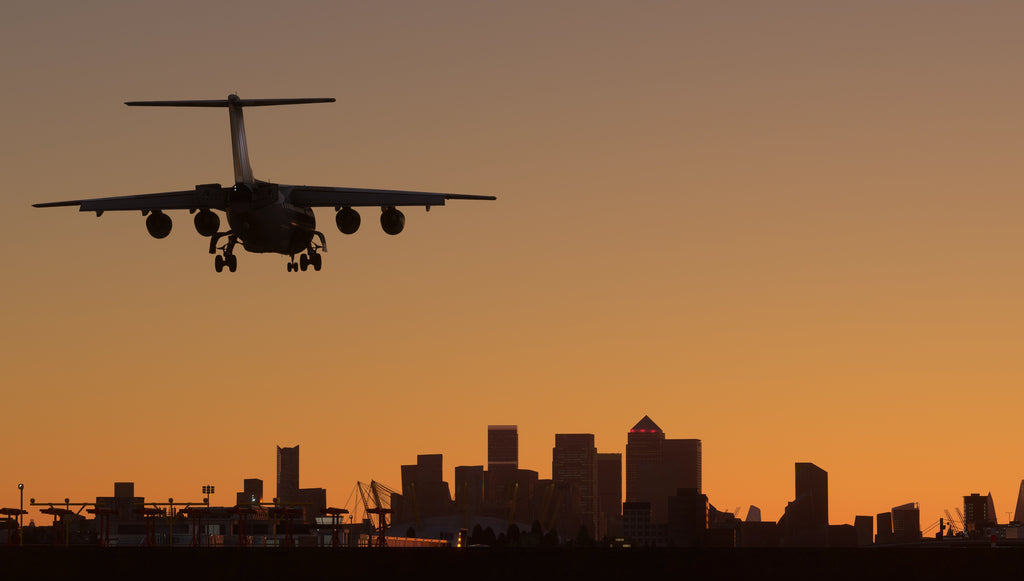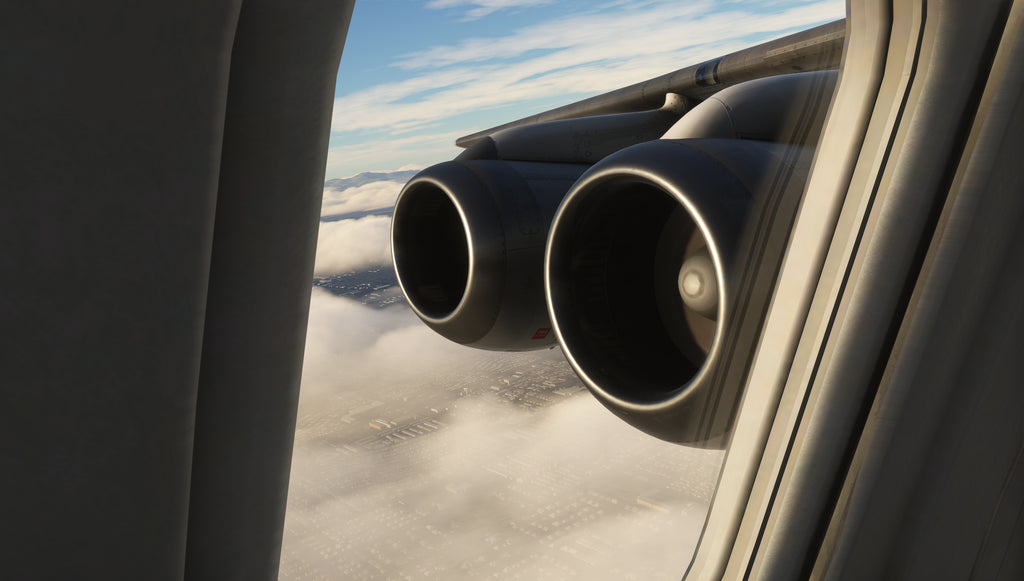VARIANTS
- 146-100
- 146-200
- 146-300
- 146-200 QC & QT (cargo)
- 146-300 QT (cargo)
- CC.Mk2 (RAF VIP configuration with countermeasure pods)
- C.Mk3 (RAF cargo configuration with countermeasure pods)
MODEL
- Accurately modelled using real-world aircraft plans and comprehensive photography of the real aircraft (G-JEAO, ZE701 and ZE708)
- Numerous animations, including:
- Trailing edge flap surfaces
- Wing-mounted spoilers and tail-mounted airbrake
- All passenger, service and cargo doors, and integral airstairs
- Windscreen wipers
- Distinctive retractable tricycle landing gear
- Countermeasure pods, HF aerial and more - Physically Based Rendering (PBR) materials produce realistic metallic, plastic and glass surfaces
- 4K and 8K textures are used to produce the highest possible texture clarity
- Authentic labelling and placards based on those found in the real aircraft, with decals used for high-resolution text
- Ground services support (marshaller, fuel truck etc.)
- Full support for MSFS visual icing effects
- Highly detailed and fully simulated passenger and cargo cabins
- Captain and First Officer positions are modelled with hundreds of functional switches, knobs and controls. Even the pilot and observer seats, cup holders and sun visors are functional!
- A truly 3D cockpit environment right down to accurately modelled seat belts and screw heads - every instrument is constructed fully in 3D with smooth animations
- Cockpit textures feature wear and tear based on reference photos taken in the real aircraft to produce an authentic environment
- Aircraft state system which will automatically save the aircraft state whenever a flight is saved and reload it whenever that flight is loaded
- Aircraft configuration system which allows you to choose between 'Cold & Dark', ‘Turnaround’ or 'Ready for Take-off'
- Many features have been added to help with usability such as the ability to hide the control yokes for a better view of the instruments and pre-set camera views for the overhead panel, centre pedestal and jump seat, hidden clickspot for setting all altimeters to standard and controlling all four N1 and TGT bugs, and automatic ground idle selection
- Developed using the latest MSFS standards, including intuitive and easy-to-use controls for rotary knobs, multi-position switches and levers
- Fully compatible with MSFS VR mode
- EFB tablet with a plethora of features including boarding simulation, failures menu and interactive checklists, as well as SimBrief and Navigraph supportFully interactable and customisable paper charts and checklists
The 146 comes with a variety of airline liveries from the UK, USA, Australia, Europe and more.
- Air France Express (G-JEAT)
- AirUK (G-UKPC)
- British Aerospace demonstrator (G-SSSH)
- Dan-Air London (G-BKMN)
- Formula One Flight Operations White (G-OFOM)
- Formula One Flight Operations Silver (G-OFOA)
- Jersey European (G-JEAO)
- Pacific Southwest Airlines (N246SS)
- United Express (N463AP)
- AirCal (N146AC)
- Air Canada Jazz (C-GRNZ)
- American Airlines (N699AA)
- Cello Aviation (G-RAJJ)
- Cobham Aviation (VH-NJG)
- Continental Express (N406XV)
- Jota Aviation (G-SMLA)
- QantasLink (VH-NJJ)
- SN Brussels Airlines (OO-DJJ)
- USAir (N165US)
- Crossair (HB-IXD)
- Discovery Air (N882DV)
- TNT Airways (OO-TAZ)
- Titan Airways (G-ZAPK)
- TNT Airways 1990s (G-TNTA)
- Ansett Australia Airlines Cargo (VH-JJZ)
- Titan Airways (G-ZAPR)
- Aer Lingus (EI-CTO)
- Air New Zealand (ZK-NZN)
- Ansett Australia (VH-EWM)
- Astra Airlines (SX-DIZ)
- British Airways (G-OINV)
- Eurowings (D-AQUA)
- Cobham Aviation Services (VH-NJN)
- Flybe (G-JEBC)
- KLM UK (G-UKAC)
- Buzz (G-UKID)
- United Express (N615AW)
- ASL Airlines (EC-MID)
- Australian Air Express (VH-NJM)
- Jota Aviation (G-JOTE)
- TNT Airways (OO-TAD)
- RAF Statesman modern (ZE701 – Queen’s Flight)
- RAF Statesman 1980s (ZE701 – Queen’s Flight)
- RAF (ZE708)
146 Professional features custom-coded aircraft systems with a high degree of complexity and depth, including:
- Automatic and manual pressurisation modes with control of outflow valves, barometric and cabin rate settings, indications and cabin altitude warnings
- Cabin altitude and differential values based on real-world data
- Automatic and manual flight deck and cabin temperature control – takes account of ambient temperature, air supply from the engines and/or APU, fresh or recirculated air and even whether the doors are open!
Auto-flight system
- Autopilot and flight director system with multiple modes:
- Pitch - altitude arm and hold, vertical speed, IAS, Mach, glideslope and go-around
- Roll – VLOC, BLOC, LNAV (FMC) and HDG
- Turbulence mode
- Pitch and bank selection and hold
- Sync mode for quick changes to aircraft attitude - Fully-functional mode annunciations, engagement and disengagement criteria (including roll and pitch rate cut-out and stall cut-out) and integration with ADI and HSI
- Simulated CAT 2 approach monitoring system
Electronic Flight Bag (EFB)
The aircraft is equipped with a tablet EFB for controlling various aircraft options and payloads, including:
- Set fuel quantity in individual tanks (including total fuel weight, automatically split between tanks)
- Set payloads in passenger cabin and cargo holds (including Zero Fuel Weight)
- Control the pilot and cabin announcements
- Quickly select aircraft states (Ready for Take-off, Turnaround and Cold-and-Dark)
- Toggle ground power unit (GPU) and chocks
- Monitor CG position and automatically set take-off trim based on CG
- Aircraft configuration menu with many options, including altimeter sync, traditional/TCAS VSI, state saving, cabin lighting, model options and much more
- Import your SimBrief flight and view a summary or scrollable full OFP
- Monitor your position in real time using a map view with tracking, zoom and pan options
- Explore and view your Navigraph charts
- Use a notepad for making notes during the flight, particularly useful for noting down clearances and taxi instructions
Flight Management System
- Two fully functional FMSs for lateral navigation (LNAV): a 'Modern' option based on the popular Working Title Pro Line 21 FMS and a 'Classic option simulating the Universal UNS-1 FMS
- Up-to-date AIRAC cycles (Working Title FMS updated via the Navigraph MSFS database; Universal UNS-1 updatable via the Navigraph Hub app with a subscription)
- Lateral navigation integration with LNAV autopilot mode and HSI
- Ability to manually input full flight plans
- SimBrief flight plan import function
- Import flight plan from MSFS main menu (Working Title FMS only)
- SID and STAR support
- Holding pattern support
- Navigation and performance monitoring
Communication system
- Dual VHF COMM, NAV and ADF radios, with 8.33kHz spacing support
- Cockpit voice recorder test and indication systems
- Functioning audio selector and PA chime
Electrical system
- Independent engine, APU and external power (AC and DC) sources
- Generator and TRU loading, and automatic load switching
- Standby generator and inverter power sources for non-normal procedures
- Independent AC channels, including normal, essential and emergency busbars, and bus-ties facilities
Fire protection system
- Engine, APU and fuselage fire detection and warning systems
- Engine fire extinguishing system
- Fully simulated test functionality
Flight controls
- Servo-tab simulation – the position of elevator and aileron surfaces is dependent on servo-tab control inputs and airflow over the surface
- Iconic tail-mounted airbrakes, roll and lift spoilers with independent hydraulic sources, realistic deployment times and custom AC and PTU pump sounds
- Flight control disconnect and yoke control lock functionality
- Accurately simulated flap system with hydraulic and electrical power sources, baulk override, fault testing and iconic howl when deployed in the air
- Stall identification and warning systems, including stick shaker and pusher, and inhibit mode
- Simulated configuration warning system
- Flap Trim Compensation (FTC) system on the 146-300
Fuel system
- Realistic fuel load and burn based on real-world data
- Simulated electrical normal and hydraulic standby fuel pumps, centre and wing tanks with feed tanks for each engine, and LP and HP fuel cocks
- Fully functional centre-to-wing fuel transfer, cross-feed and common-feed valves
- Auxiliary fuel tanks fitted (can be toggled via the EFB) to provide additional range - great for bizjet operations
Hydraulic system
- Independent yellow and green hydraulic systems with realistic pressure, quantity and supply to other systems
- Simulated AC- and DC-driven back-up pumps and power transfer unit (PTU)
- Functional standby generator for supplying AC and DC electrical power in non-normal situations
- Simulated depleting brake pressure over time when hydraulic supply is removed
- Simulated airbrake deployment over time when hydraulic supply is removed
Ice and rain protection system
- Ice detection and accumulation simulation, anti-icing and de-icing functionality for exterior surfaces, warning systems for in-flight monitoring
- Simulation of separate inner and outer wing anti-icing, and windscreen overheating
- A vast array of annunciators, including accurately simulated Master Warning System (MWS) with amber and red cautions, audible warnings and ground testing for all systems
- Flight Data Entry Panel (FDEP) for entering flight details (date, flight leg and number)
- Normal and emergency gear extension, including gear down-lock override
- Gear configuration indication and warning systems
- Simulated brake accumulators supplied via the hydraulic power sources (yellow or green), anti-skid and brake temperature indicator with cooling down periods that are affected by ambient temperature, brake usage and brake fans
- Captain and First Officer tillers for realistic nose-wheel steering
- Transponder with TCAS (integrated with VSI TCAS display) and flight ID input functionality
- Dual RMI/DBI and HSI navigation instruments, fed by two NAV and ADF radios, including DME hold function
- Instrument source selector for NAV 1, NAV 2 or dual navigation via the ADI, HSI and auto-flight system
- Choice of traditional or TCAS VSI
- Fully functioning test modes on navigation instruments (e.g. HSI, radio altimeter and ADI)
- Custom-coded GPWS with modes 1-6, steep approach mode, flap warning override and test functionality
- Flight crew and passenger oxygen systems with valve and mask deployment controls
- Realistic bleed air demand from engines and APU, and pneumatic supply to air-conditioning and ice protection systems
- Realistic APU start and shutdown procedures, and bleed air and electrical power supply
- RPM, TGT and fuel burn values based on real-world data
- Animations panel for controlling passenger and service doors, lower cargo doors and fuselage cargo door
- Deployable airstairs, powered by the Yellow hydraulic system
- Doors and airstairs can be controlled manually via their respective handles and levers in the cabin
- N1, N2, TGT, oil pressures and temperatures will all differ subtly between engines
- Accurately simulated Thrust Modulation System (TMS) with take-off (full or flexible), maximum continuous thrust, TGT and descent modes. Takes account of engine bleed air requirements, e.g. for air conditioning and ice protection systems.
- Realistic engine start procedures with external, APU or cross-start sources
- Simulation of ground and flight idle baulks
- Take-off and landing speed card which automatically displays reference speeds depending on current aircraft weight, and settable airspeed indicator and engine instrument bugs
- Independent lighting controls for Captain and First Officer
- Dimmable integral lighting for each panel
- Dimmable dynamic flood and storm lighting for a highly immersive and customisable night environment (more than 10 individual light sources, including entry, lap, sill and flight kit)
- Freely moveable lap and sill lighting
- Accurately simulated exterior lighting, including wing, logo and runway exit lights, and taxi/landing and navigation lights with different intensities
- Realistic passenger cabin and cargo area lighting
- MSFS-native (Wwise) sound package taking full advantage of the new MSFS capabilities
- Studio quality Lycoming ALF-502 engine noise recorded from RAF C.Mk3 ZE708
- Over 450 flight deck sound effects recorded from RAF CC.Mk2 ZE701
- Detailed equipment audio such as the APU, brake fans, electrical circuits, hydraulic equipment and many more
- Distinctive flap retraction/extension airflow ‘howling’ sound
- Detailed physics-based effects on engine and wind noise
- Accurately positioned 3D sound sources (best enjoyed in VR!)
- Custom crash and scraping effects
- Cabin audio for chimes, airstairs and doors, and even a functional coffee maker!
- Fully functional music player with seven music tracks as standard and the ability to import custom music tracks
- Realistic and accurate performance in the air and on the ground, using unique flight models for all variants based on real-world performance and handling data, and input from real-world 146 pilots
- Custom effects for enhanced immersion, including engine, GPU and APU exhaust haze
- Complete exterior lights package as seen on the real 146, including landing, wing, runway, logo and taxi lights that illuminate objects and the ground, for ease of operation during the hours of darkness
Passenger cabine
- Highly detailed and fully interactable passenger cabins for each of the 146 variants
- Unique 146 cabin features include a curved aft cabin where seat layout reduces from a 3+3 to a 2+2 configuration for the last few rows, window blanks and smaller overhead bins
- Extensive simulation of the cabin environment, including fully animated and interactable cabin doors and airstairs, lighting controls, cabin call panels and even a functional coffee maker and circuit breakers
- Ground service electrical bus simulation
- Independent lighting controls for galleys, ceiling, side wall, toilet and worktop.
- AUTO CABIN CREW option on the EFB that, when enabled, simulates the cabin crew performing their duties during the flight, including responding to cabin call chime, playing cabin music during passenger boarding and after landing, and performing passenger announcements
- Fully simulated music player with play, pause, skip, shuffle, repeat and volume functions
- Potable water that depletes throughout the flight and varies depending on coffee maker usage
- Freighter cabins included for 200QC, 200QT and 300QC
- 260+ page PDF Operations Manual with flight tutorial, systems guide, procedures, limitations and handling notes
- 20+ page PDF EFB manual with detailed information on all EFB features
- 50+ page UNS-1 Operations Manual
- Multiple interior and exterior camera presets, including wing views
- PSD Paint Kit (2.1GB) available so you can create your own paint schemes
- Full support for MSFS checklists (manual and Automatic/Co-pilot modes)
- Support for numerous control assignments for compatibility with controllers and hardware
- GSX compatible; aircraft profiles included for each 146 variant
Available since
2022-05-12
Supported Simulators
Microsoft Flight Simulator 2020 and 2024
MSFS 2024 Native
Yes
Version
v1.2.5
Supported Operating System
Windows
Installation Method
Standalone Installer
Download Size
4.85 GB
Installation Size
4.86 GB
Videos
Reviews
Reviews can be written and liked using the
Contrail App
Review by DocTrench
of
v0.1.8
| current version is
v1.2.5
Some pros and cons
Pros:
A really nice flight model, no idea if it's accurate but it feels really nice to handfly
Good systems depth (with a couple exceptions that'll be noted below)
Good sounds
A basic but functional EFB with Simbrief and Navigraph integration
Steam gauges and high pilot workload all the way
Cons:
Currently uses the default FMC (an update should be coming that'll add the correct FMC sometime in the near future)
It cruises at .70 so don't expect to get anywhere fast
Since the simbrief update I've occasionally had issues getting the EFB to load simbrief OFPs
Steam gauges and high pilot workload all the way
It's not for children of the purple line, but if you want a jet from the 80s that feels like it was made in the 60s, this is for you.





































